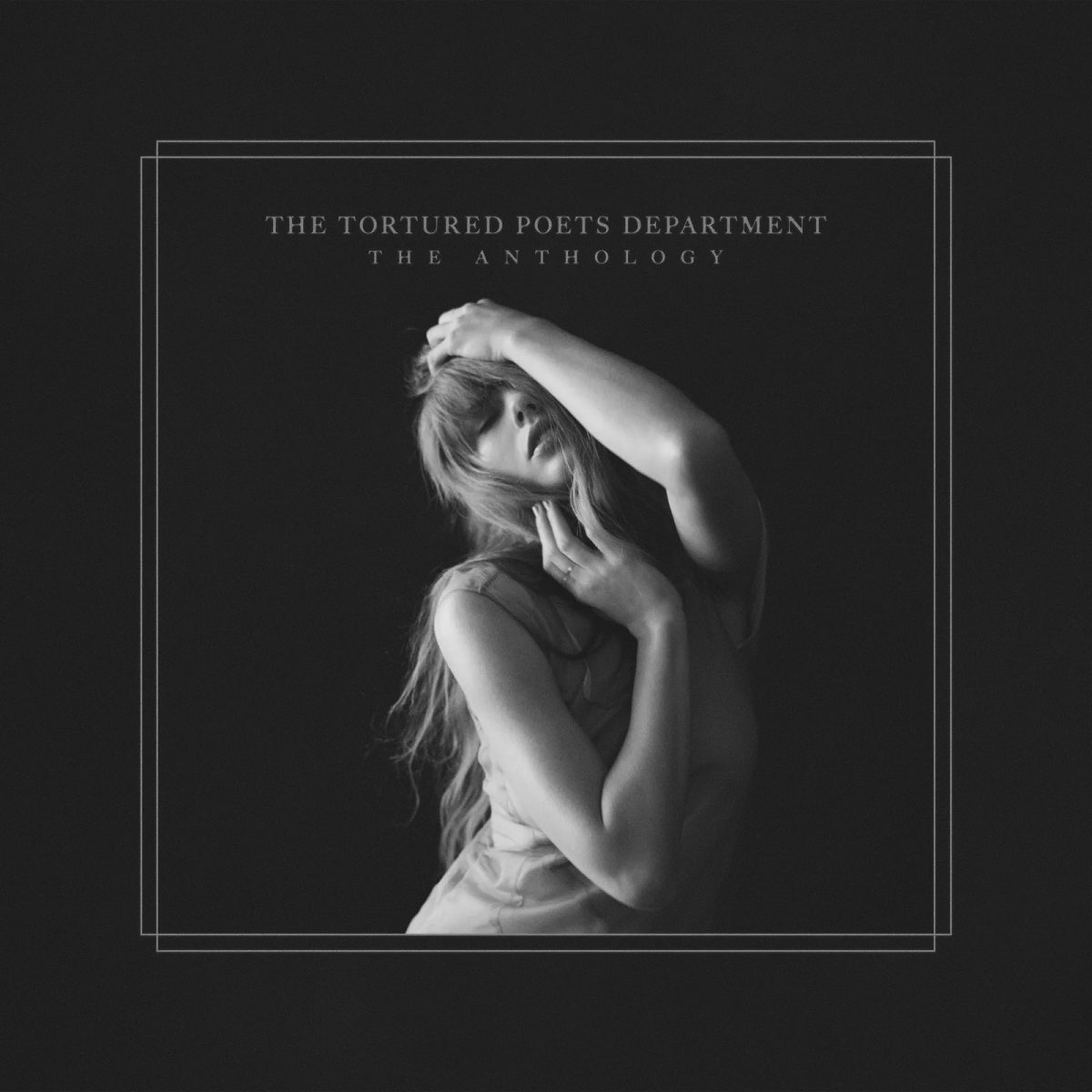Taylor Swift released her highly anticipated eleventh album, “The Tortured Poets Department” (“TTPD”), on April 19. According to Forbes Magazine, the album became the most streamed album in a single day and week on Spotify and the year’s best-selling album.
“TTPD” came shortly after the end of Swift’s six-year-long relationship with Joe Alwyn, her fling with Matty Healy and the start of her current relationship with football player Travis Kelce. Her album delves deep into the intricacies of these relationships, exploring themes of heartbreak and fame with lyrical prowess.
The first song of the album, “Fortnight,” features ethereal, subtle vocals from Post Malone and imagines a future where Swift and Alwyn have both grown apart and married new people. The word “Fortnight” does not refer to a literal period of two weeks, but rather the fact that their relationship feels so short compared to the time that’s passed since it ended. The differences between Alwyn’s future relationship and Swift’s are striking. While his wife “waters flowers,” Swift’s husband “is cheating.” Swift repeats “I love you, it’s ruining my life,” reflecting her fear that while Alwyn will find a happy relationship, she will never truly move on. Although she “took the miracle move-on drug,” a nod to her dalliance with Healy, the “effects were temporary,” and she realizes that she still loves Alwyn. As a first song, “Fortnight” works incredibly well to summarize the album’s focus–Swift’s breakup with Alwyn and her inability to move on.
In her song “How Did It End,” Swift confirms that her relationship with Alwyn ended due to her fame and his preference for a more private life. In the song, she calls Alwyn a “hot house flower,” or a very fragile and sheltered person, while she is an “outdoorsman” who enjoys a more public life. Through these lyrics, Swift masterfully introduces the theme of her superstardom and its effect on her relationships.
Swift expands on this theme in “The Prophecy,” where she “caught lightning in a bottle,” referring to her relationship with Alwyn. She also says that she “got cursed like Eve got bitten,” comparing the pursuit of her career to the biblical figure Eve’s pursuit of knowledge that doomed her from paradise. Swift begs a higher power to “change the prophecy,” saying that she doesn’t “want money/just someone who wants [her] company.” Ultimately, Swift fears that she has “sealed her fate” by choosing her career over love and worries that she will never find her soulmate.
Many of Swift’s other songs discuss the pressures of fame, especially concerning public perceptions of her relationships. In her song “But Daddy I Love Him,” she asserts that her “good name” is hers “alone to disgrace,” and says that she’d “rather burn [her] whole life down” than continue listening to the “griping and moaning,” presumably about her relationship with Matty Healy.
More of “TTPD” explores Swift’s relationship with Healy. During the Eras Tour, Swift was seen mouthing the words “This is about you, you know who you are” to Matty Healy before singing “Cardigan,” a song from her 2020 album “Folklore.” In “Cardigan,” Swift describes the man who leaves her as “Peter losing Wendy,” which Swift expands on in the “TTPD” song “Peter.” In the song, Swift says Peter was “twenty-five,” the age Healy was when his relationship with Swift began, and that he said that he was “gonna grow up” and “come find [her].” However, Swift is disappointed when she realizes that Healy did not grow up and remained just as immature as ever, leading to the couple’s breakup.
Amid the relationship drama of this album, Swift comments on the duplicity of fame as something that brings pain. In her song “Clara Bow,” she discusses the fleeting nature of fame, referencing Clara Bow, the ‘it girl’ of the early 1900s. Swift feels that the second her “girlish glow/flickers just so” people will try to replace her with new pop stars that are “like Taylor Swift” but with an “edge she never [had].” She elaborates on the pressures of maintaining her image in her deceptively upbeat song “I Can Do it With A Broken Heart,” where she describes her experience post-breakup performing at the Eras Tour. Swift says that even though “all the pieces of [her] shattered” on the stage, the crowd still wanted “more!” The song’s engaging rhythm and catchy chorus hide its melancholy lyrics, mirroring Swift’s deception of her tour audience in a period of distress. While some might consider these songs to feature an out-of-touch celebrity complaining about their success, they tackle her issues with startling nuance and relatability. Almost everyone can identify with Swift’s descriptions of stifling pressure, and these songs contextualize the issues discussed in the rest of the album.
“TTPD” isn’t perfect, however. Some fans note that her song “imgonnagetyouback” uses the same wordplay as Olivia Rodrigo’s song “get him back!,” except it is more clumsily executed. Other songs, such as “I Hate It Here,” which discusses Swift’s escapist tendencies, or “Robin,” about childhood innocence, feel out of place within the album’s narrative. While releasing “TTPD” as a double album allows Swift to cover more ground with complexity, it sometimes makes the album feel unedited and bloated. Toward the end of the album, the production style of Swift’s familiar collaborators Aaron Dessner and Jack Antonoff become slightly monotonous, but the eloquent lyrics manage to keep the songs interesting. Overall, the album stands as a testament to Swift’s ability to encapsulate the most vulnerable aspects of the human experience with lyrical and melodic brilliance.
















































